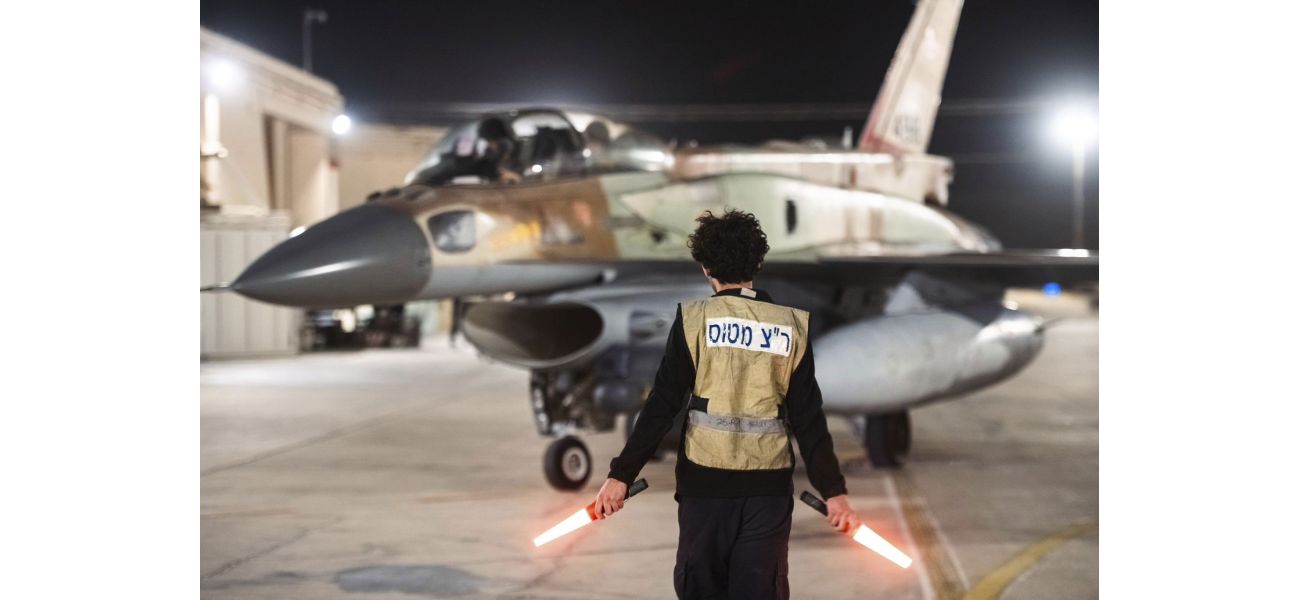Israel strikes Iranian military sites in early morning aerial attacks.
Israel's army openly struck Iran for the first time ever.
October 26th 2024.

In a move that marks a significant escalation in the ongoing conflict between Israel and Iran, the Israeli military launched a series of airstrikes on military targets in Iran early Saturday morning. This was in retaliation for the barrage of ballistic missiles that Iran had fired on Israel earlier this month. It was the first time that Israel had publicly acknowledged attacking Iran, a country that it considered to be a major threat.
According to the Israeli military, the airstrikes targeted facilities that Iran had been using to manufacture the missiles that it had fired at Israel. They also hit surface-to-air missile sites. However, there was no evidence to suggest that the airstrikes had targeted Iran's oil or nuclear sites. Iran downplayed the strikes, claiming that they had only caused limited damage. This was in stark contrast to the Israeli military's claims that the strikes had been successful in hitting their intended targets.
Despite these airstrikes, both Israel and Iran seemed to be trying to avoid further escalation of the conflict. This was evidenced by the fact that neither country had targeted each other's nuclear or oil facilities. However, tensions between the two archenemies remained high, as militant groups backed by Iran, such as Hamas in Gaza and Hezbollah in Lebanon, continued to engage in warfare with Israel.
After the airstrikes, Iran's Foreign Ministry issued a statement saying that it considered itself entitled and obligated to defend against acts of aggression from foreign countries. This sentiment was echoed by Foreign Minister Abbas Araghchi, who stated that Iran had no limits in defending its interests. However, Iran's military also issued a carefully worded statement, suggesting that a ceasefire in Israel's ground offensives in Gaza and Lebanon would take precedence over any possible retaliatory strikes.
Iran's state-run IRNA news agency reported that four people had been killed in the airstrikes, all of them from the military air defense. Iran's military claimed that the strikes had targeted military bases in three provinces: Ilam, Khuzestan, and Tehran. However, there was no response from Iran's paramilitary Revolutionary Guard, which raised questions about whether anything had been hit at its bases.
US President Joe Biden stated that Israel had informed him of the airstrikes beforehand and that it appeared that they had only targeted military sites. He also revealed that his administration had previously received assurances from Israel that they would not hit Iran's nuclear or oil installations. "I hope this is the end," Biden said, indicating his desire for the conflict to de-escalate.
This was the first time that Israel had openly attacked Iran, which was a significant development in their decades-long conflict. Iran had not faced such a sustained barrage of fire from a foreign enemy since the 1980s war with Iraq. Explosions could be heard in Tehran until sunrise, and images released by the Israeli military showed members preparing to depart for the airstrikes in American-made F-15 and F-16 warplanes.
The Iranian military stated that Israeli warplanes had fired lightweight missiles from a distance of 100km from the Iranian border. The missiles reportedly struck air defense radar stations, some of which were already under repair. However, the Revolutionary Guard, which oversees Iran's vast arsenal of ballistic missiles, remained silent, leading some to question whether the airstrikes had been successful in hitting their intended targets.
While the airstrikes did not target highly visible or symbolic facilities that could provoke a significant response from Iran, they did weaken the country's air defense capabilities. This gave Israel room for escalation if needed, while also sending a message that they were not seeking further conflict at the moment. The fact that the airstrikes had been successful without causing significant damage or civilian casualties also indicated Israel's military precision and superiority over Iran.
This sentiment was echoed by Sanam Vakil, the director of the Middle East and North Africa program at the London-based think tank Chatham House, who stated that Israel had again demonstrated its military capabilities were superior to Iran's. She also noted that by targeting military sites and missile facilities rather than nuclear or energy infrastructure, Israel was signaling that they did not want further escalation at this time.
After the airstrikes, life in Iran's capital, Tehran, seemed to continue as normal, with schools and shops remaining open. However, there were long lines at gas stations, a regular occurrence when military violence flares up as people stock up on supplies. Some residents appeared anxious and avoided speaking to reporters.
The airstrikes received mixed reactions both at home and abroad. Israeli opposition leader Yair Lapid criticized the decision to avoid targeting strategic and economic targets, stating that Israel could and should have inflicted a heavier price on Iran. The United States warned against further retaliation, while Britain and Germany urged Iran not to respond. The UN secretary-general's spokesperson condemned all acts of escalation and called for them to stop.
Saudi Arabia, a country that had previously been at odds with Iran, also condemned the strikes, calling them a violation of Iran's sovereignty and international laws and norms. Hezbollah and Hamas, two militant groups backed by Iran, also condemned the attack. The ongoing conflict has caused tensions to soar in the region, with multiple countries being affected.
The conflict between Israel and Iran has been ongoing since the 1979 Islamic Revolution, with both countries considering each other to be their greatest threat. This has led to a decades-long shadow war between the two countries, with Iran's nuclear program being a major point of contention. This conflict has also spilled over into other areas, such as attacks on shipping in the Middle East.
The shadow war between Israel and Iran has increasingly moved into the light since October 7, 2023, when Hamas and other militants attacked Israel, resulting in the deaths of over 1,200 people and the taking of 250 hostages. In response, Israel launched a devastating air and ground offensive, displacing over a million Lebanese people and causing widespread destruction and loss of life. The ongoing conflict has resulted in the deaths of tens of thousands of Palestinians and has had a significant impact on the region's stability.
In conclusion, the airstrikes by Israel on military targets in Iran represent a significant escalation in the ongoing conflict between the two countries. While both sides seem to be attempting to avoid further escalation, tensions remain high, and the possibility of a full-scale war cannot be ruled out. The impact of this conflict on the region and its people continues to be devastating, with innocent civilians bearing the brunt of the violence.
According to the Israeli military, the airstrikes targeted facilities that Iran had been using to manufacture the missiles that it had fired at Israel. They also hit surface-to-air missile sites. However, there was no evidence to suggest that the airstrikes had targeted Iran's oil or nuclear sites. Iran downplayed the strikes, claiming that they had only caused limited damage. This was in stark contrast to the Israeli military's claims that the strikes had been successful in hitting their intended targets.
Despite these airstrikes, both Israel and Iran seemed to be trying to avoid further escalation of the conflict. This was evidenced by the fact that neither country had targeted each other's nuclear or oil facilities. However, tensions between the two archenemies remained high, as militant groups backed by Iran, such as Hamas in Gaza and Hezbollah in Lebanon, continued to engage in warfare with Israel.
After the airstrikes, Iran's Foreign Ministry issued a statement saying that it considered itself entitled and obligated to defend against acts of aggression from foreign countries. This sentiment was echoed by Foreign Minister Abbas Araghchi, who stated that Iran had no limits in defending its interests. However, Iran's military also issued a carefully worded statement, suggesting that a ceasefire in Israel's ground offensives in Gaza and Lebanon would take precedence over any possible retaliatory strikes.
Iran's state-run IRNA news agency reported that four people had been killed in the airstrikes, all of them from the military air defense. Iran's military claimed that the strikes had targeted military bases in three provinces: Ilam, Khuzestan, and Tehran. However, there was no response from Iran's paramilitary Revolutionary Guard, which raised questions about whether anything had been hit at its bases.
US President Joe Biden stated that Israel had informed him of the airstrikes beforehand and that it appeared that they had only targeted military sites. He also revealed that his administration had previously received assurances from Israel that they would not hit Iran's nuclear or oil installations. "I hope this is the end," Biden said, indicating his desire for the conflict to de-escalate.
This was the first time that Israel had openly attacked Iran, which was a significant development in their decades-long conflict. Iran had not faced such a sustained barrage of fire from a foreign enemy since the 1980s war with Iraq. Explosions could be heard in Tehran until sunrise, and images released by the Israeli military showed members preparing to depart for the airstrikes in American-made F-15 and F-16 warplanes.
The Iranian military stated that Israeli warplanes had fired lightweight missiles from a distance of 100km from the Iranian border. The missiles reportedly struck air defense radar stations, some of which were already under repair. However, the Revolutionary Guard, which oversees Iran's vast arsenal of ballistic missiles, remained silent, leading some to question whether the airstrikes had been successful in hitting their intended targets.
While the airstrikes did not target highly visible or symbolic facilities that could provoke a significant response from Iran, they did weaken the country's air defense capabilities. This gave Israel room for escalation if needed, while also sending a message that they were not seeking further conflict at the moment. The fact that the airstrikes had been successful without causing significant damage or civilian casualties also indicated Israel's military precision and superiority over Iran.
This sentiment was echoed by Sanam Vakil, the director of the Middle East and North Africa program at the London-based think tank Chatham House, who stated that Israel had again demonstrated its military capabilities were superior to Iran's. She also noted that by targeting military sites and missile facilities rather than nuclear or energy infrastructure, Israel was signaling that they did not want further escalation at this time.
After the airstrikes, life in Iran's capital, Tehran, seemed to continue as normal, with schools and shops remaining open. However, there were long lines at gas stations, a regular occurrence when military violence flares up as people stock up on supplies. Some residents appeared anxious and avoided speaking to reporters.
The airstrikes received mixed reactions both at home and abroad. Israeli opposition leader Yair Lapid criticized the decision to avoid targeting strategic and economic targets, stating that Israel could and should have inflicted a heavier price on Iran. The United States warned against further retaliation, while Britain and Germany urged Iran not to respond. The UN secretary-general's spokesperson condemned all acts of escalation and called for them to stop.
Saudi Arabia, a country that had previously been at odds with Iran, also condemned the strikes, calling them a violation of Iran's sovereignty and international laws and norms. Hezbollah and Hamas, two militant groups backed by Iran, also condemned the attack. The ongoing conflict has caused tensions to soar in the region, with multiple countries being affected.
The conflict between Israel and Iran has been ongoing since the 1979 Islamic Revolution, with both countries considering each other to be their greatest threat. This has led to a decades-long shadow war between the two countries, with Iran's nuclear program being a major point of contention. This conflict has also spilled over into other areas, such as attacks on shipping in the Middle East.
The shadow war between Israel and Iran has increasingly moved into the light since October 7, 2023, when Hamas and other militants attacked Israel, resulting in the deaths of over 1,200 people and the taking of 250 hostages. In response, Israel launched a devastating air and ground offensive, displacing over a million Lebanese people and causing widespread destruction and loss of life. The ongoing conflict has resulted in the deaths of tens of thousands of Palestinians and has had a significant impact on the region's stability.
In conclusion, the airstrikes by Israel on military targets in Iran represent a significant escalation in the ongoing conflict between the two countries. While both sides seem to be attempting to avoid further escalation, tensions remain high, and the possibility of a full-scale war cannot be ruled out. The impact of this conflict on the region and its people continues to be devastating, with innocent civilians bearing the brunt of the violence.
[This article has been trending online recently and has been generated with AI. Your feed is customized.]
[Generative AI is experimental.]
0
0
Submit Comment





